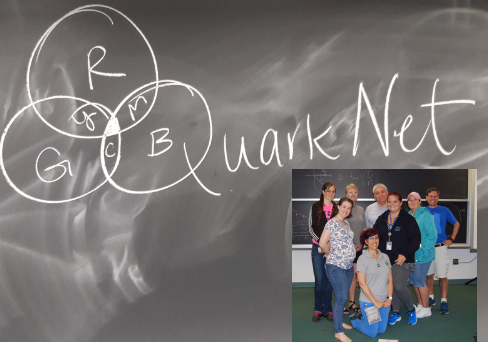Friday Flyer - May 10, 2019

Spotlight on the University of Florida QuarkNet Center
The University of Florida center was restarted about two years ago after enthusiastic teacher response to CMS coding workshops for teachers pioneered in Florida by Teaching and Learning fellow Adam LaMee and UF physicist Sergey Gleyzer. Last summer, lead teachers Diane McDilda and Aliza Bar-David went to Data Camp and learned more about QuarkNet and particle physics. In August 2018, the group jumped into neutrino physics with a Neutrino Data Workshop. The work the group did helped to shape development of the MINERvA Neutrino Masterclass that debuted in International Masterclasses 2019. UF is a small, new group that is already doing very good work with the guidance of mentor Darin Acosta.


News from QuarkNet Central
An important reminder to any teacher with a cosmic ray detector: You may have noticed the recent glitch in the GPS. To learn more and find out what do do, read the QuarkNet Cosmic Ray Detector GPS Alert. If you decide to max your tech points by handling the problem yourself, follow these "diy" instructions and good luck.
Our last Friday Flyer of the 2018-19 academic year will come out on May 24. Just two more after this one!
Folks who have been in QuarkNet awhile may remember Greg Snow as one of the pioneers of large arrays of cosmic ray detectors in schools with his Cosmic Ray Observation Program (CROP). Greg passed away on May 4; other details are in his Fermilab obituary.

Physics Experiment Roundup
China has a collider in the capital: Beijing Electron Position Collider (BEPC) II, where physicists were able to measure polarization of baryons from J/Ψ decay. According to Interactions, this adds a new test for CP violation. Looking further afield, that is, everywhere, physicists are closing in on dark energy using a variety of methods, as reported in Cosmos.

Resources
We have a spice-blow of articles from symmetry: on the dark sector, exploring how computer deep learning aids particle physics discovery, and showing how a key HEP tool folds space science with the rise of astrostatistics. Then there is a sandstorm of information from this Department of Energy "Direct Current" podcast about DUNE.

Just for Fun
Sometimes we detect particles. Sometimes physics gumshoes do other detective work. Physics Today is like that, on the tail of a strange case, first tracking down the origin of one mysterious uranium cube and then searching for the big trove that no one can find. One of the witers of the first tale, Tim Koeth, worked the Rutgers QuarkNet beat years ago and now hangs his shingle in College Park.
We all like lists, right? This Listverse entry is just our sort of stuff.
QuarkNet Staff:
Mark Adams: adams@fnal.gov
Ken Cecire: kcecire@nd.edu
Shane Wood: swood5@nd.edu
